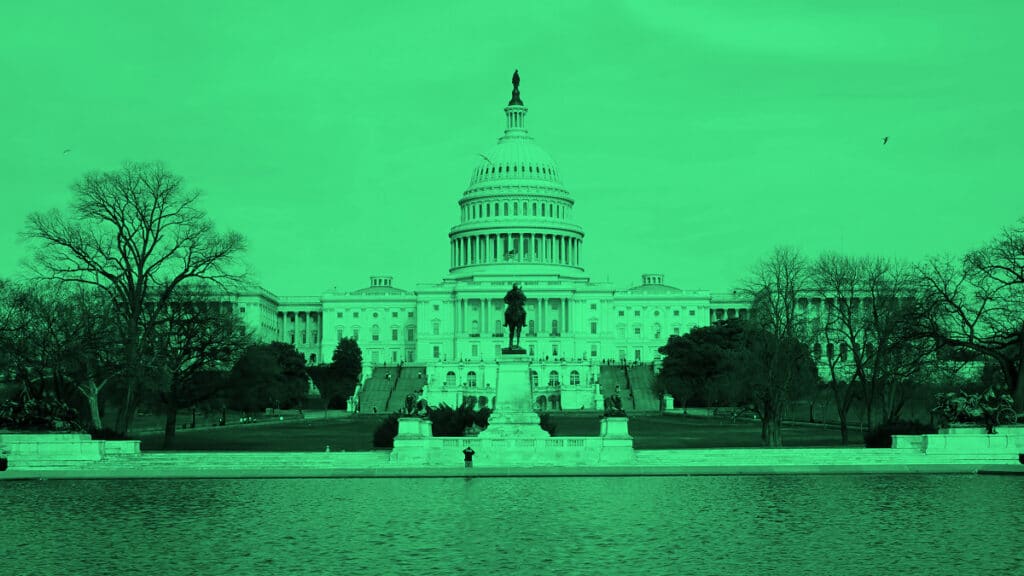November 2022 U.S. Tech Policy Roundup
Kennedy Patlan, Rachel Lau / Dec 1, 2022Kennedy Patlan and Rachel Lau are associates at Freedman Consulting, LLC, where they work with leading public interest foundations and nonprofits on technology policy issues.

The results of November’s United States midterm elections will shape tech policy both in the lame duck session and for the coming two years as a new political landscape comes into focus. As the GOP prepares to take control of the House in January and Democrats retain power in the Senate and the White House, activists are mounting a push to pass antitrust legislation in the lame duck session. The midterms also carry significant implications for a wide range of tech-related issues, including high-speed-internet funding and online privacy.
In industry, major layoffs at large tech companies like Facebook, Amazon, Netflix, and Twitter made the news this month as the companies downsized to cut costs. Following Elon Musk’s acquisition of Twitter in October, Musk has fired thousands of employees at the company, including cuts to the platform’s trust and safety, curation, and public policy teams. Twitter’s ad revenue has crashed since the takeover, and Musk claimed that Apple threatened to remove Twitter from the App Store. The platform is also showing signs of larger technical problems, while the new paid function allowing Twitter users to buy verified checkmarks has exacerbated the platform’s existing problems with misinformation. Although Musk has posted preliminary rules on Twitter’s new misinformation and content policies, the company has not announced how it will address false claims made by users and recently stopped enforcing its policy against COVID misinformation. With Twitter’s content moderation system significantly weakened, activists argue that government entities should set content moderation guardrails before Twitter’s misinformation problem impacts upcoming elections.
The below analysis is based on techpolicytracker.org, where we maintain a comprehensive database of legislation and other public policy proposals related to platforms, artificial intelligence, and relevant tech policy issues. Read on to learn more about November U.S. tech policy highlights from the White House, Congress, and beyond.
Final Efforts to Enact Tech Policy Legislation Before a New Congress Arrives
- Summary: As the 117th Congress comes to a close, legislators, advocacy groups, and constituents have all been pushing Congress to act on a range of tech legislation. This legislation includes antitrust bills, like the American Innovation and Choice Online Act (S. 2992) and the Open App Markets Act (S.2710); and privacy bills, like the American Data Privacy and Protection Act (H.R. 8152), the Kids Online Safety Act (S.663), and the Children and Teens Online Privacy Protection Act (S. 1628). Read more below for the latest advocacy updates on each.
Antitrust:
- The American Innovation and Choice Online Act (S. 2992) and the Open App Markets Act (S.2710): In mid-November, a group of smaller tech companies including Neeva and DuckDuckGo launched an advertising campaign in support of the AICOA, urging Congress to pass the bill before the end of the year. In a letter pushing Senate Majority Leader Chuck Schumer (D-NY) to act on both the AICOA and the Open Markets Act, more than 40 public interest organizations also encouraged top lawmakers to pass the bills before the end of this lame duck session. Meanwhile, tech executives have also been meeting with White House officials to discuss antitrust legislation, while those officials are also engaged with Congressional leadership, expressing support for passing the two antitrust bills during the lame duck session. White House Press Secretary Karine Jean-Pierre commented, “We are very committed to moving ambitious tech antitrust legislation and we’re stepping up engagement during the lame duck on the President’s agenda across the board, including antitrust. There’s a bipartisan support for these antitrust bills and no reason why Congress can’t act before the end of the year.” Brookings Visiting Fellow Bill Baer wrote on the current state of play: “If Senator Klobuchar (D-MN) and Representative [David] Cicilline (D-RI) can rebuild their bipartisan coalition in the next few weeks with the help of an emboldened President Biden, those bills could squeak through before year’s end.” The legislative calendar is tight, however, and prospects for a vote remain uncertain.
- Merger Filing Fee Modernization Act (H.R. 3843 / S.228 / S.1260): Both chambers have passed versions of this legislation, most recently the House in October. To become law, both chambers must agree on bill text and pass the same legislation. After this month’s issues with Ticketmaster concert sales raising concerns around lack of competition in the ticketing industry, Senator Klobuchar has expressed hope that fans can help Congress move antitrust actions forward.
Privacy-Related Legislation:
- The American Data Privacy and Protection Act (ADPPA, H.R. 8152): Co-sponsors involved in the push to pass the ADPPA are eager to get the bill over the finish line. A spokesman for Representative Frank Pallone (D-NJ), the House and Energy Commerce Committee Chair, said that Pallone “is focused on passing the comprehensive American Data Privacy and Protection Act before the end of the year.” David Morar, a policy fellow at the Open Technology Institute also wrote a piece for Tech Policy Press, explaining why this lame duck session is the best opportunity to get the ADPPA passed.
- The Children and Teen’s Online Privacy Protection Act (S. 1628) and Kids Online Safety Act (S.663): This month, Congress was confronted with meetings and letters from supporters and opponents of the Kids Online Safety Act (KOSA) alike. In early November, Senator Maria Cantwell (D-WA) and Senator Schumer each received letters from online children safety advocates urging them to advance the Kids Online Safety Act. In mid-November, parents whose children’s deaths were linked to social media met with policymakers including Senators Richard Blumenthal (D-CT) and Marsha Blackburn (R-TN), encouraging them to pass bills focused on greater online protections for children and teens. 95 groups who oppose KOSA sent a letter to Senator Schumer and Senate Commerce leaders including Senator Cantwell, and Senator Roger Wicker (R-MS), urging them to “not move forward” on the Kids Online Safety Act during the last months of the 117th session. Groups that signed the letter expressed concerns about the implications the bill may have on children's rights to access content, potential privacy implications for LGBTQ+ and other vulnerable children at home, and the possibility to “counter-intuitively encourage platforms to collect more personal information about all users.”
- What We’re Reading: The Hillreported on the history of the AICOA legislation process and the bill’s roadblocks in Congress. Bloomberg Law covered predictions for White House and Congressional approaches to tech policy in the 118th Congress.
Looking Ahead to the 118th Congress
- Summary: With the Democrats surprisingly retaining control of the Senate and the Republicans taking the House, the upcoming lame duck session and split Congress will have implications for tech nominees and policy. The Democrats’ continued control of the Senate is favorable for nominees who are awaiting approval, including Gigi Sohn, who has yet to be confirmed as FCC commissioner; and Democratic FCC Commissioner Geoffrey Starks, who is up for reconfirmation at the end of 2023. On the other hand, according to NPR, Rep. Jim Jordan (R-OH), who will likely become chair of the House Judiciary Committee in January, and Rep. Cathy McMorris Rodgers (R-WA), who is on track to chair the House Energy and Commerce Committee, have historically pushed for content moderation policies that limit the ability of platforms to moderate speech. House Republicans have indicated that passing legislation targeting large tech companies will be a top priority. Rep. McMorris Rodgers’s Big Tech, Censorship and Data Task Force will likely continue to push for the abolition of Section 230, but different perspectives between and among Democrats and Republicans may continue to hinder bipartisan tech policy efforts – Rep. Kevin McCarthy (R-CA), currently the front runner to become Speaker, has not historically supported antitrust efforts and may instead focus on content moderation.
- The midterms also included state-level tech policy decisions. For example, voters in Montana overwhelmingly approved an explicit ban on law enforcement seizing consumers’ personal data without a warrant in their state constitution.
- Stakeholder Response: Tech Policy Press interviewed experts from civil society groups on the impact of the midterm elections on tech policy. Emma Llansó, Director of the Free Expression Project at the Center for Democracy and Technology (CDT) weighed in on the pushback against disinformation research. Yosef Getachew, Director of the Media and Democracy Program at Common Cause, talked about how the slim margins in the House and Senate will likely impact tech policy moving forward. Finally, Matt Wood, Vice President of Policy and General Counsel at Free Press, elaborated on the landscape following the midterms.
- What We’re Reading: The Wall Street Journalalso weighed in on the election’s influence on tech policy. The Registeranalyzed the predicted impact of the California Congressional block on tech policy in the lame duck period. Axios, CNN, Brookings and Politico all discussed the effects that the U.S. midterm results may have on tech policy.
Executive Order on Spyware Anticipated in 2023
- Summary: In late November, the Departments of Commerce and State sent a letter to Rep. Jim Himes (D-CT) announcing upcoming plans for an executive order to “prohibit U.S. Government operational use of commercial spyware that poses counterintelligence or security risks to the United States or risks of being used improperly.” The Biden Administration reportedly plans to announce the executive order in the first quarter of 2023, although the action will be dependent on interagency vetting and approval. The letter comes in response to a September letter from Rep. Himes and fourteen other representatives on the House Permanent Select Committee on Intelligence to Secretary of State Antony Blinken and Secretary of Commerce Gina Raimondo expressing concerns about potentially unethical uses of foreign commercial spyware and pressing the executive branch to address the risks associated with the technology.
- Stakeholder Response: Rep. Himes responded to the letter at an event hosted by the Center for a New American Security, acknowledging it as a step forward while noting that the proposed executive order stops short of a full operational ban on spyware for the U.S. government.
- What We’re Reading: The New York Timesreported on the declassification of internal F.B.I. documents on Pegasus and other related spyware. The Washington Postpublished comments by a senior administration official on the executive order as well as other news in the spyware space. The New Yorker chronicled efforts to sue Pegasus-maker NSO Group in American courts over hacking abuses in El Salvador.
New Legislation and Policy Updates
- Integrity, Notification, and Fairness in Online Retail Marketplaces for Consumers (INFORM) Act (H.R. 5502, sponsored by Rep. Jan Schakowsky (D-IL): The INFORM Consumers Act, which requires e-commerce sites like Amazon to verify the identities of top sellers on their platforms more thoroughly and forces marketplaces to disclose basic information about third-party sellers, passed the House 381-39 this month. The U.S. Chamber of Commerce applauded the passage. The Senate companion bill, S.936, was included in the Senate version of the Fiscal Year 2023 National Defense Authorization Act in October; negotiations over this defense bill are ongoing.
- Informing Consumers about Smart Devices Act (sponsored by Sen. Maria Cantwell (D-WA) and Sen. Ted Cruz (R-TX)): This month, Senators Maria Cantwell and Ted Cruz introduced the Informing Consumers about Smart Devices Act, which would require the disclosure of the presence of microphones or cameras on products. The House version of the bill, H.R. 4081, passed the House earlier this month.
Public Opinion Spotlight
A poll conducted by the Knight Foundation and Ipsos with 1,024 American adults from October 14-16, 2022 regarding midterm election disinformation found that:
- “76 percent of Americans think false information about elections is a problem on social media platforms."
- "61 percent of Americans are 'very' or 'somewhat' concerned people in their community might make a decision on how to vote in the 2022 midterms based on false or misleading information,” while just one in four are concerned they themselves might do so."
- “84 percent of Americans believe social media companies should restrict posts offering to buy or sell votes with cash or gifts."
- "83 percent of Americans believe social media companies should restrict content that gives voters an incorrect day to vote."
- "80 percent of Americans believe social media companies should restrict content that misleads voters about how to fill out or submit their mail-in ballot."
- "69 percent of Americans believe social media companies should restrict claims of election fraud with inaccurate or no evidence.”
Morning Consult conducted a survey from October 29-31, 2022 with 2,202 U.S. adults regarding the data privacy expectations of Gen Z, baby boomers, millennials, and Gen Xers. They found that:
- "52 percent of all U.S. adults say that keeping data private and secure is a baseline expectation they have of companies, and doing that alone does not make them think better of a company."
- "70 percent of all adults said they would have a more positive impression of a company that explains to its users how it protects their data."
- "71 percent of all adults said they would have a more positive impression of a company that gives users the option to delete stored personal data."
- "66 percent of all adults said they would have a more positive impression of a company that does not collect or store any personally identifiable information.”
- - -
We welcome feedback on how this roundup and the underlying tracker could be most helpful in your work – please contact Alex Hart and Kennedy Patlan with your thoughts.
Authors

